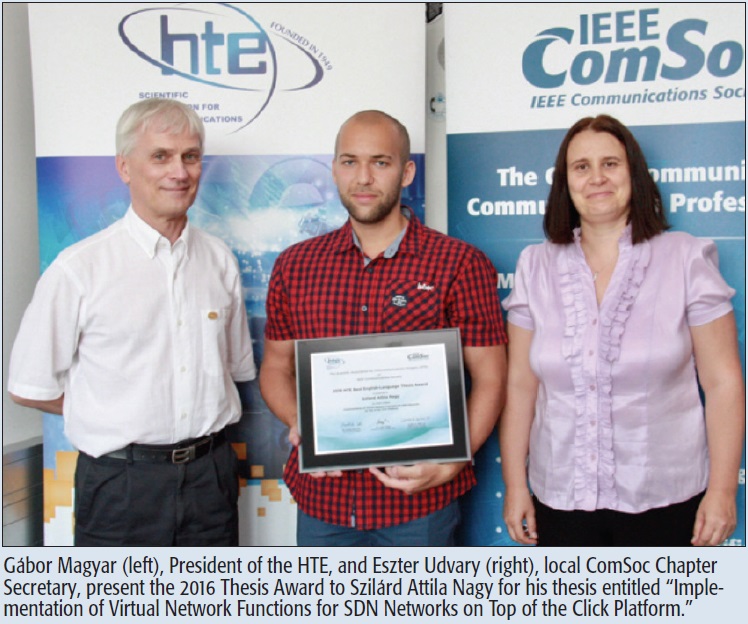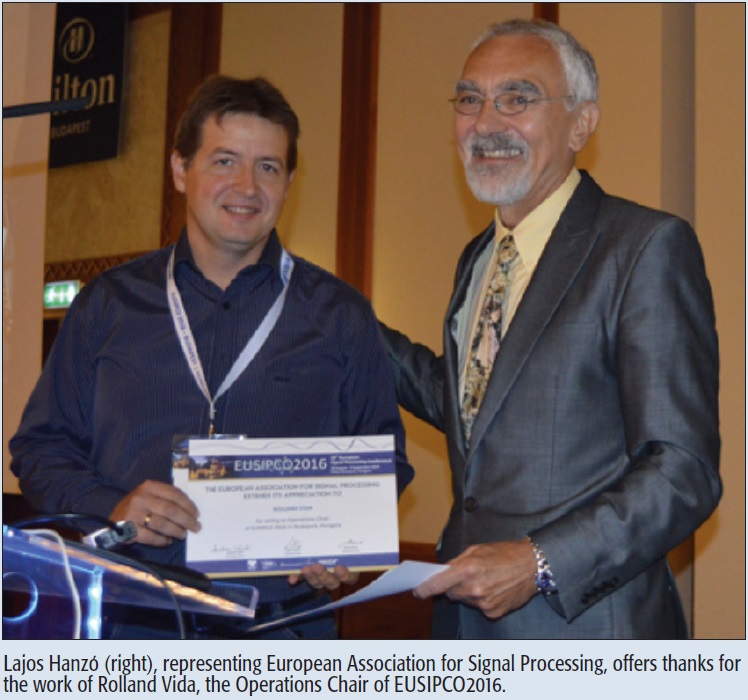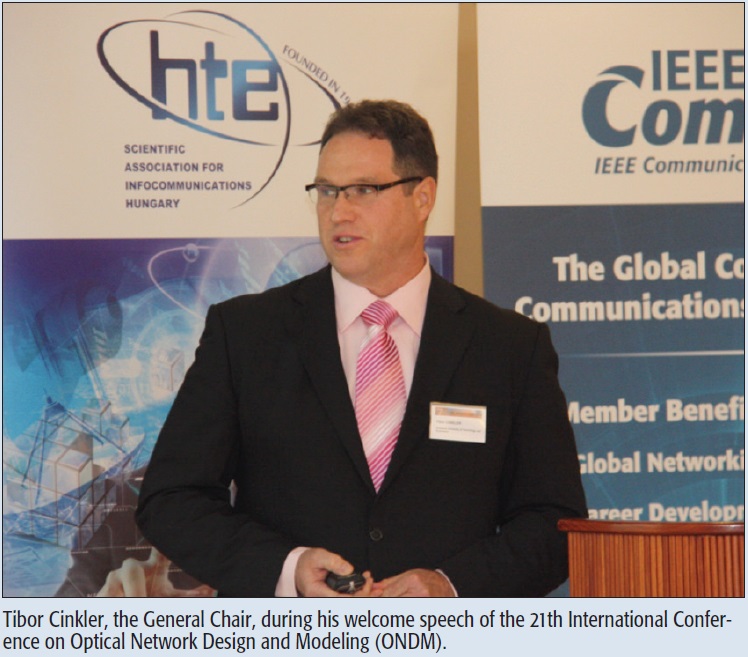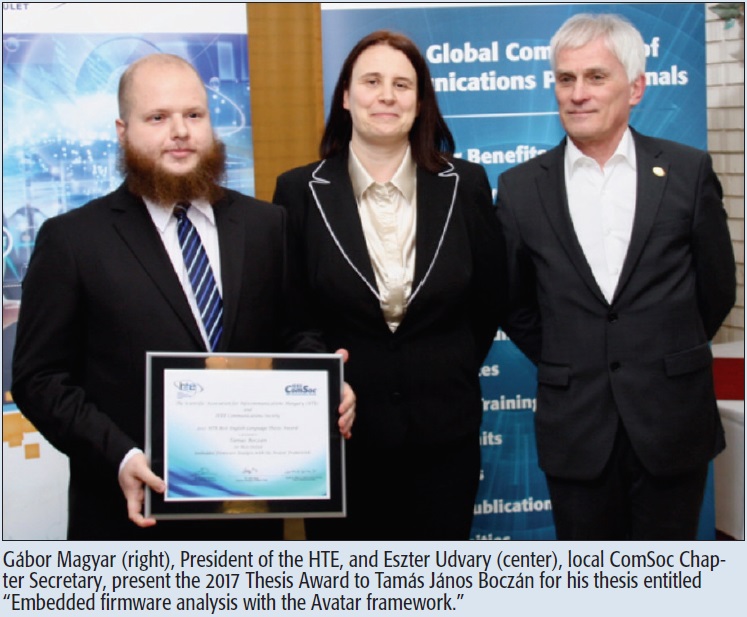
Building on its rich heritage, the Scientific Association for Infocommunications (HTE), the Hungarian Sister Society of IEEE ComSoc, continuously works to serve its community, and the last two busy years were no exceptions to that. Continuing the tradition of organizing prestigious conferences in its area of expertise, HTE organized numerous events during the past years and is already active in the preparation of new ones in the immediate future. Furthermore, its key members took active roles in the governing bodies of IEEE ComSoc and other IEEE entities. HTE also supports the activities of the IEEE Hungary Section, the synergies of this cooperation strengthening the presence of IEEE in Hungary. Last but not least, HTE is proud to present the HTE Thesis Awards in cooperation with IEEE ComSoc, an important gesture toward the new generation of members of our organization. In this article some aspects of HTE’s activities will be highlighted.
Recent Activities

For HTE it is a strategic objective to support conferences on topics that fall into its fields of interest, attract prestigious international audiences and high quality contributions, and offer at the same time an affordable opportunity to the community members from the region to join and interact with the international community. That is why HTE is proud to be able to continue its tradition of organizing relevant conferences during the last two years as well.
In August 2016 Budapest welcomed the international research community working in the field of computer based speech technology at the 18th International Conference on Speech and Computer (SPECOM’16). This was a joint organizational effort of the Budapest University of Technology and Economics (BME), and the prestigious Russian research institution Géza Németh was acting both as the chief representative of the related Hungarian research community and as leader of the organizing team. The keynote speakers of the event were Ralf Schlueter (RWTH Aachen University, Germany), with a presentation on neural networks based speech recognition; Attila Vékony (NNG, Hungary), talking about the role of speech recognition in car navigation; and Nick Campbell (Trinity College Dublin, Ireland) with a talk about machine processing of dialogue states.
The following month HTE organized the European flagship conference of the signal processing community, the European Signal Processing Conference (EUSIPCO’16), which also covered the field of IoT and sensor networks. The more than 600 participants had the chance to follow a comprehensive technical program addressing all the latest developments in research and technology for signal processing. Additionally, tutorials covering various areas like deep learning, 5G wireless optimization or applied statistics were offered to the interested colleagues. Respected scholars presented keynote talks during the conference, as follows. Urbashi Mitra (University of Southern California, USA) talked about biological communication networks; Moe Win (MIT, USA) discussed the signal processing opportunities in the field of network localization and navigation; Asoke K. Nandi (Brunel University London, UK) talked about consensus clustering paradigms; Petar M. Djuric (Stony Brook University, USA) spoke about about recent advances in the sequential Monte Carlo methods; and an overview of future directions in video coding was presented by Thomas Wiegand (TU Berlin, Germany).

The 21th International Conference on Optical Network Design and Modeling (ONDM) was also organized by HTE in Budapest, in May 2017. This conference is intended for researchers active in the field of optical networking and optical systems, focusing on new network architectures for the Cloud/Data Center and SDN/NFV developments in optical networks. The organizers invited Ari Sorsaniemi (DG Connect, European Commission) to present the current state of optical communications within the 5G framework under the European Commission’s H2020 program, and Daniel Kilper (University of Arizona, USA) to talk about the use of SDN to make networks transparent.
Last autumn HTE also welcomed the 18th SDL Forum, the flagship conference of the SDL Forum Society, providing a framework for discussions about the evolution and use of system design languages and modelling technologies. One of the keynotes, titled IoT & 5G: Opportunities and Technologies, was offered by the host of the conference, Gergely Seres (Ericsson, Hungary), while the other keynote speaker, Ferhat Khendek (Concordia University, Canada), president of the SDL Forum Association, talked about model driven engineering.
In good accordance with its national role and as an answer to the needs of its institutional members, HTE is also regularly organizing its own national flagship conferences that established themselves as strong brands in the region. In 2016 HTE organized the 20th edition of the HTE Infokom conference, a traditional forum for the industrial, academic, policy maker and regulatory actors, with 350+ attendees. In line with the international trends, the main technological keywords during this year’s edition were 5G, Big Data, IoT and cloud. Since at the level of the European Commission the digital single market is of key priority, dedicated sections evaluated the prospects and local implications of this policy.
In 2017 HTE organized the 15th edition of MediaNet, a prominent media technological event of the Hungarian infocommunications community. The 250+ attendees discussed the latest stages of technological development (e.g. new media production and broadcasting technologies and digital radio), the impact of social media on day-to-day life, and regulatory issues triggered by new technologies.
HTE is also supporting the European-wide research interest in Future Networks and it is an organizing partner of the annual Hungarian Future Internet Conferences. The 2016 and 2017 editions of the conference had a special focus on Smart City applications, had an international participation and offered a panorama of current trends in Future Internet research. These events are always a regional meeting point for potential partners seeking international research project cooperation targeting EU H2020 open calls.
Finally, although HTE as an organization is not directly involved, we must mention here that the prestigious ACM SIGCOMM 2018 conference occurred in Budapest in late August this year, and several individual members of HTE were among the main members of the organizing committee.
The Cooperation of HTE with IEEE ComSoc

HTE is proud to have several members who undertake responsible tasks in the global IEEE ComSoc organization. Lajos Hanzó is a member of the Board of Governors, Rolland Vida and Péter Nagy are members of the GLOBECOM and ICC Management and Strategy Committee (GIMS), while Csaba Simon is a member of the Sister and Related Societies Board.
An important aspect of HTE, IEEE relations is the local cooperation with the IEEE Hungary Section. The presence in Hungary and the successful local operation of IEEE are important and desirable for HTE. Joint operation increases the awareness of the technical areas that are important for the HTE member organizations, and mobilizes the stakeholders to work as volunteers in different joint projects, e.g., organizing conferences and holding public seminars. HTE helps the IEEE Hungary Section with its event organizing and logistics capabilities when required and gains increased visibility.
HTE traditionally supports outstanding young professionals as well, through a series of awards, e.g., the Pollák–Virág Award and HTE Thesis Awards). The goals are manifold: offering incentives to increase the quality of work, providing feedback to young researchers, expressing public support for technical research, and rewarding excellence. HTE allocates dedicated tracks for young scientists at its flagship conferences, and supports their access, through volunteering programs, to the international conferences it hosts or supports. All these efforts also help to build around the organization a community of young professionals who will be its human resource in the future.
IEEE ComSoc helped HTE to raise to the next level its Thesis Awards program by kindly accepting to support it. As a result, during the last two years the IEEE ComSoc community welcomed the first recipients of the Annual HTE Best English-Language Thesis Award. The Thesis Award is an important part of the new membership recruitment strategy of HTE; proper attention and efforts will thus be allocated to keep this activity on track.
About HTE
HTE, the Scientific Association for Infocommunications, founded in 1949 (formerly known as the Scientific Society for Telecommunications), is a voluntary and autonomous professional society of engineers and economists, researchers and businessmen, managers and educational, regulatory and other professionals working in the fields of telecommunications, broadcasting, electronics, information and media technologies in Hungary.
In addition to its more than 900 individual members, HTE has more than 50 corporate members. Among them are large companies and small and medium enterprises with industrial, trade, service-providing, research and development activities, as well as educational institutions and research centers.
HTE is a Sister Society of the IEEE Communications Society and as such it channels its members toward IEEE Societies and IEEE activities and leverages its local and regional organizational know-how to support the IEEE vision to come true.
Csaba Simon and Rolland Vida are with the Department of Telecommunications and Media Informatics, Budapest University of Technology and Economics. Péter Nagy is with the Scientific Association for Infocommunications (HTE). The authors can be reached by email at {simon|vida@tmit.bme.hu}, {nagy.peter@hte.hu}.